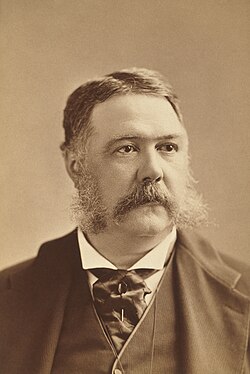Chester A. Arthur
| God, guns, and freedom U.S. Politics |
| Starting arguments over Thanksgiving dinner |
| Persons of interest |
Chester A. Arthur (1829–1886) was the twenty-first President of the United States, taking office after the assassination of James A. Garfield.[1] Arthur was incredibly popular among the Stalwart faction of the Republican Party, mostly because of his involvement in "Roscoe Conkling’s Stalwart Republican machine,"[2] with Conkling being the Republican Senator who led the campaign for nominating Ulysses S. Grant at the 1880 Republican National Convention.[3] In spite of this, he ended up going against the Stalwarts as President, becoming "a champion of civil service reform."[2]
Arthur became President after Garfield was assassinated by Charles Guiteau, himself the "Stalwart of Stalwarts" who killed Garfield specifically in hopes it would bring Stalwart views to the Republican Party.[4] However, Arthur instead signed the Pendleton Act in 1883, which essentially gave the Half-Breeds everything they wanted.[5] This was largely due to the widespread belief that the Stalwart ideas which caused Garfield to be shot needed to be stamped out; not doing so would essentially be vindicating the assassination in the first place.[1]
Arthur is notable among Presidents from this era for his opposition to racism, defending a black woman named Lizzie Jennings in her lawsuit against a street company that forced her out of a car only intended for white passengers in 1854! Unsurprisingly, Arthur was also an abolitionist and pleaded for an enslaved man who sued for his freedom on the basis that he was brought to the free state of New York.[1] However, this didn't prevent him from signing the Chinese Exclusion Act,![]() the only law in U.S. history to specifically ban immigration of a certain ethnicity.[6]
the only law in U.S. history to specifically ban immigration of a certain ethnicity.[6]
He is also different in that he engaged in physical conflicts with others over politics in his youth. As Thomas Reeves noted in his biography on Arthur:
As a further diversion, in the fall of 1844 he joined a number of young Whigs who built an "ash pole" to testify to their support of Henry Clay, and took part in a brawl with another group of adolescents who objected. Years later, as President, Arthur thought back to this bruising struggle and chuckled, "I have been in many a political battle since then, but none livelier, or that more thoroughly enlisted me."[7]:32
The original birther controversy[edit]
Arthur is also notable for being the first President who was accused of not being born in the United States, which if true would have made him unable to become President under the Constitution.[8] According to a rumor started by the Democratic Party of the time, Arthur was not born in Vermont, as he claimed, but in Canada.[9] One of the people behind this narrative, Arthur P. Hinman, had also previously accused Arthur of being born in Ireland and moving to the United States when he was a teenager.[10] So clearly, dishonesty behind such accusations is nothing new either.
References[edit]
- ↑ 1.0 1.1 1.2 Chester A. Arthur Britannica
- ↑ 2.0 2.1 Chester A. Arthur Whitehouse.gov
- ↑ Roscoe Conkling Britannica
- ↑ A Stalwart of Stalwarts National Archive
- ↑ Pendleton Act (1883) National Archive
- ↑ Chinese Exclusion Act (1882), National Archives
- ↑ Gentleman Boss: The Life of Chester Alan Arthur by Thomas C. Reeves
- ↑ The Executive Branch whitehouse.gov
- ↑ The original "birther" controversy CBS News
- ↑ Then Again: A Vermont politician faces the ‘birthers’ VT Digger


